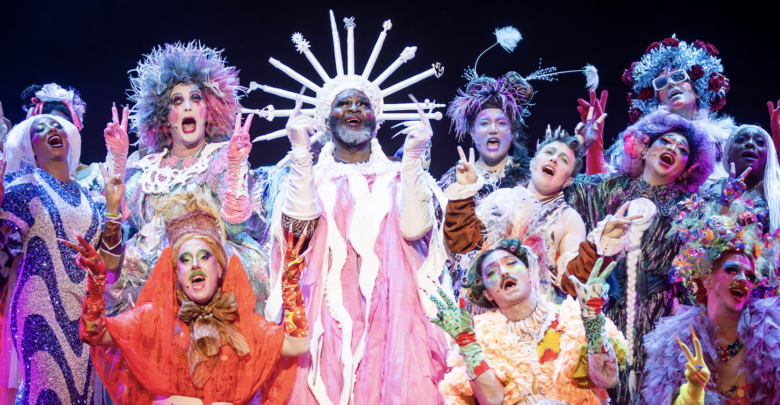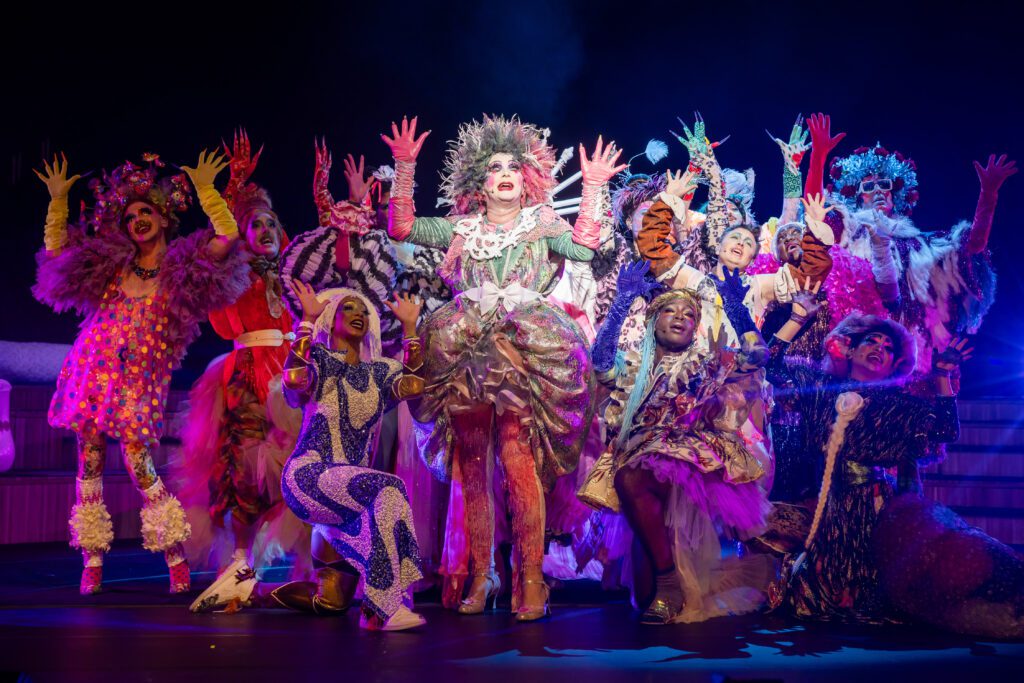

“I’m neither female nor male,” says Taylor Mac. “My gender is performer.”
Mac — a singer, songwriter, playwright and MacArthur “genius” grant recipient — is on hand for the dress rehearsal of “Bark of Millions,” Mac’s radical, queer, rock-opera drag show that opens at BAM’s Harvey Theater February 5 and runs through February 10.
The show takes its name from an Ancient Egyptian myth about the dual-gender sun deity, Ra. The Bark, explains Mac, is a mythical boat the god Ra travels on, bringing the sun with them every day. And as such, Mac’s show seeks to let the sun shine on a Pantheon of queer icons through the ages in a four-hour spectacle of song, drag and dance.

‘Bark of Millions’ at Sydney Opera House (Photo by Daniel Boud)
The musical production is the latest lavish extravaganza by Mac, who conceived the show, which had its world debut in Sydney last fall. Mac wrote the lyrics and performs, along with two dozen other singers and instrumentalists.
Obie Award-winner Matt Ray is the composer, and the wildly colorful, overstuffed costumes, complete with enormous, light-up headdresses (think Marie Antoinette on acid) are designed by Machine Dazzle, who has created costumes for Justin Vivian Bond, Basil Twist, Diane von Furstenberg, as well as the 2019 Metropolitan Museum of Art Gala.
But amidst the sequined and feathered glitz, it’s the songs that take center stage. All 55 of them.
There is no plot or narrative here, no musical book; it’s a non-stop, no-intermission sonic kaleidoscope that sweeps through rock, jazz, blues, soul, Motown and even an unexpected Italian bar serenade. That said, some may struggle to listen to song after song without a story or plot. (The show and its 55 songs might have been better suited for a venue like Joe’s Pub where patrons can at least eat and drink).
Of course, those who are familiar with Mac know that a four-hour run time is nothing compared to his “A 24-Decade History of Popular Music,” a 24-hour marathon performed at St Ann’s Warehouse in 2016 that Wesley Morris, The New York Times’s critic at large, called “one of the great experiences of my life”). It is now the subject of an HBO documentary by Oscar-winning directors Rob Epstein (“The Times of Harvey Milk”) and Jeffrey Friedman (“Linda Ronstadt: The Sound of My Voice”).
The genesis of “Bark of Millions,” Mac explains, dates back to 2019, the year that marked the 50th anniversary of Stonewall. That was the year that many in the community were “fed up with the increasingly corporate-dominated mainstream Pride Parade and decided to create an alternative, which we named the Queer Liberation March, an anti-corporate event,” says Ann Northrop, co-host of television’s Gay USA.
While Northrop recalls the alternative Queer Liberation March as “colorful and creative,” Taylor evidently did not experience it that way.
“I must not have gotten the memo that told everyone to wear black, so here I was, all dressed in my finery while everyone else that was marching was in jeans, t-shirts, all corporately manufactured clothes,” he says. “It was weird. Where was our individual joy? Our heterogeneity?”
Not only did Mac feel the deficit of whimsical, vibrant costumes, he also felt the lack of queer songs. “So I decided to do a big song dump and write a whole bunch of new ones. I called Matt Ray, my longtime musical partner, and he said yes, let’s do it,” says Mac.
As Ray describes it, “the show isn’t really about Stonewall. It’s about honoring and illuminating our queer history rather than commenting on it. The message of the show is that queer people didn’t just start with Stonewall. We’ve been around forever and we wanted to write songs about our history.”
The songs were inspired by different queer people throughout history, LGBTQIA+ pioneers like James Baldwin, Oscar Wilde, Marsha P. Johnson, Frankie Knuckles, Margaret Cho — plus a few others who never actually existed.
“But the show is not about those people,” says Mac. “For example, we’re not representing Marsha P. Johnson, we’re singing a song inspired by her activism.”
The lyrics in the song about Johnson pay tribute to her courage and vision as a founding member of the Gay Liberation Front who played a pivotal role in resisting police during the Stonewall uprising: “It takes the ones who have been trampled, not to do what they’ve been told, but to pull the teeth from those who step on them and pave the streets with filling gold.”
The lyrical shoutout to Margaret Cho, the openly bi-sexual comedian, goes like this:
“And I thought of your joke
how it’s built from the broke
little bits from a pain
ringing sunlight from rain
Oh Margaret Cho.
And your joke went like this
I’m not straight, I’m not gay
I’m just slutty, and hey
Where is my parade
Oh woe and sorrow.”
Each member of the ensemble deserves their dues. The mesmerizing Nigerian-British baritone sensation, Le Gateau Chocolat, dominated the room with clear, resonant, deep notes that anchored the stage with seductive command.
Viva DeConcini’s piercing electric guitar brought a lively rock twist. And one sultry singer peeled off a tasteful chocolate-satin draped gown to reveal a sequined full-bodied pantsuit underneath in which they strutted though a bluesy song about “sugar in her tank.”
Meanwhile, the whimsical Machine Dazzle graced the stage resembling a varsity Santa before transforming into a flamboyant banana, which somehow evoked the Big Apple Circus minus the lions and the acrobats.
“My tongue-in-cheek stated goal for the show is to make the audience more queer through reverse conversion therapy,” says Mac.
The talent was certainly there, but the show wasn’t exactly crammed with interesting tunes. Some worked, others were, pardon the pun, frankly a drag.
Still, while drag itself has indisputably gone mainstream — the Season 13 premiere of “RuPaul’s Drag Race” last month drew 1.3 million viewers, its highest-rated episode ever — “Bark of Millions” serves as a testament to drag’s place in the world of contemporary performative art as well.
The post The ‘reverse conversion therapy’ of Taylor Mac appeared first on Brooklyn Magazine.




